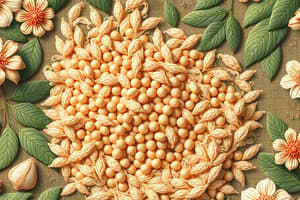Podcast
Questions and Answers
Explain the primary structural components of fats and their energy provision.
Explain the primary structural components of fats and their energy provision.
Fats are composed of a glycerol molecule bonded to three fatty acids, and they provide the most energy per gram compared to carbohydrates and proteins.
Differentiate between good fats and bad fats, including examples of each.
Differentiate between good fats and bad fats, including examples of each.
Good fats include unsaturated fats like those found in plant oils and fatty fish, while bad fats consist of saturated and trans fats commonly found in animal fats and processed foods.
Discuss how enzymes function as catalysts in biochemical reactions.
Discuss how enzymes function as catalysts in biochemical reactions.
Enzymes lower the activation energy required for biochemical reactions, allowing them to proceed at a much faster rate.
What is the significance of the enzyme-substrate complex in the catalytic process?
What is the significance of the enzyme-substrate complex in the catalytic process?
Highlight the importance of enzymes in physiological processes.
Highlight the importance of enzymes in physiological processes.
What distinguishes simple carbohydrates from complex carbohydrates?
What distinguishes simple carbohydrates from complex carbohydrates?
What role do carbohydrates play in the body during high-intensity activities?
What role do carbohydrates play in the body during high-intensity activities?
How is excess glucose stored in the body, and what is it converted into when needed?
How is excess glucose stored in the body, and what is it converted into when needed?
What are some dietary sources of complex carbohydrates?
What are some dietary sources of complex carbohydrates?
What is dietary fiber, and why is it important for digestive health?
What is dietary fiber, and why is it important for digestive health?
Describe the structure of proteins and what determines their function.
Describe the structure of proteins and what determines their function.
Why should a balanced diet include a variety of protein sources?
Why should a balanced diet include a variety of protein sources?
How do proteins serve as an energy source compared to carbohydrates?
How do proteins serve as an energy source compared to carbohydrates?
Flashcards
Carbohydrates
Carbohydrates
Organic compounds primarily made of glucose, categorized as simple or complex.
Simple Carbohydrates
Simple Carbohydrates
One or two sugar molecules (monosaccharides or disaccharides).
Complex Carbohydrates
Complex Carbohydrates
Longer chains of sugar molecules (polysaccharides), like starches.
Monosaccharides
Monosaccharides
Signup and view all the flashcards
Disaccharides
Disaccharides
Signup and view all the flashcards
Polysaccharides
Polysaccharides
Signup and view all the flashcards
Dietary Fiber
Dietary Fiber
Signup and view all the flashcards
Glycogen
Glycogen
Signup and view all the flashcards
Proteins
Proteins
Signup and view all the flashcards
Amino Acids
Amino Acids
Signup and view all the flashcards
Peptide Bonds
Peptide Bonds
Signup and view all the flashcards
Essential Amino Acids
Essential Amino Acids
Signup and view all the flashcards
Fats (Lipids)
Fats (Lipids)
Signup and view all the flashcards
Good Fats
Good Fats
Signup and view all the flashcards
Bad Fats
Bad Fats
Signup and view all the flashcards
Enzymes
Enzymes
Signup and view all the flashcards
Enzyme-substrate complex
Enzyme-substrate complex
Signup and view all the flashcards
Enzyme specificity
Enzyme specificity
Signup and view all the flashcards
Catalysts
Catalysts
Signup and view all the flashcards
Activation Energy
Activation Energy
Signup and view all the flashcards
Study Notes
Carbohydrates
- Carbohydrates, or "carbs," are organic compounds primarily made of glucose (a monosaccharide).
- Two types: simple (one or two sugar molecules) and complex (longer chains of sugar molecules).
- Simple carbs digest quickly, providing quick energy. Complex carbs break down slower, providing sustained energy.
- Simple carbs include monosaccharides (e.g., glucose, fructose) and disaccharides (e.g., sucrose). Found in fruits and honey.
- Complex carbs include polysaccharides like starches, found in grains, legumes, and starches vegetables. Offer vitamins and minerals.
- Carbohydrates are the body's primary energy source, especially during intense activity.
- Excess glucose stored as glycogen in the liver, later converted back to glucose.
- Dietary fiber is a type of carbohydrate, indigestible, aiding in digestion.
- Fiber promotes fullness, water retention, and waste expulsion (egestion).
- Sources of fiber include whole grains, fruits, vegetables, and legumes.
Proteins
- Proteins are chains of amino acids linked by peptide bonds, forming complex structures.
- Amino acid sequence determines protein shape and function.
- Proteins build and repair tissues, create enzymes, hormones, and other bodily chemicals.
- Proteins are a longer-lasting energy source than carbohydrates.
- Sources of protein include meats, fish, eggs, dairy, beans, and legumes.
- A balanced diet requires a variety of protein sources to get all essential amino acids.
Fats (Lipids)
- Fats (triglycerides/lipids) are glycerol bonded to three fatty acids.
- Provide the most energy per gram compared to carbs and proteins.
- Types:
- Good fats (unsaturated, especially polyunsaturated): beneficial for health, found in plant oils and fatty fish.
- Bad fats (saturated, trans, hydrogenated): linked to health risks, found in animal fats and processed foods.
- Healthy fat intake is crucial for heart health and overall well-being. Excessive bad fat intake can cause health issues like heart disease and obesity.
Enzymes
- Enzymes are proteins that speed up biochemical reactions by lowering activation energy.
- Enzymes are highly specific, typically catalyzing only one type of reaction or acting on a specific substrate.
- Enzyme-substrate complex forms when the enzyme binds to its substrate at the active site, converting the substrate to product. (Carbohydrase breaks down starch to simpler sugars, for example).
- Enzymes are crucial for digestion, metabolism, and DNA replication.
- Some enzymes can catalyze over 100 reactions per second, highlighting their efficiency.
Studying That Suits You
Use AI to generate personalized quizzes and flashcards to suit your learning preferences.




